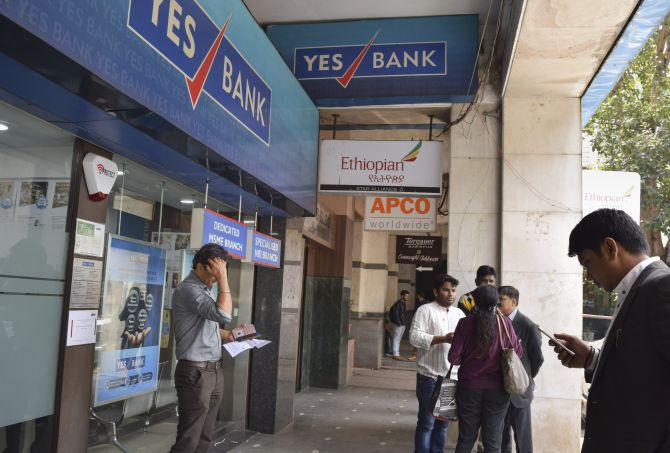With the Reserve Bank of India’s (RBI’s) draft reconstruction scheme for the troubled lender suggesting a permanent write-down of these bonds outstanding as of March 5, bondholders who have invested RS 10,800 crores are up in arms, reports Hamsini Karthik.

Holders of YES Bank’s additional tier-1 (AT-1) bonds, amounting to Rs 10,800 crore, are contemplating legal action, with the Reserve Bank of India’s (RBI’s) draft reconstruction scheme for the troubled lender suggesting a permanent write-down of these bonds outstanding as of March 5.
According to the draft scheme, the write-down is “in conformity with the extant regulations issued by the RBI based on the Basel framework”.
According to the Basel norms, if minimum tier-1 capital falls below 6 per cent, it allows for a write-off of these bonds. Classified as a quasi-equity instrument, AT-1 bonds are intended to provide additional cushion to a bank’s overall capital adequacy.
However, in terms of risks, they are riskier than tier-1 bonds. The RBI’s draft reconstruction plan for YES Bank states that AT-1 bondholders shall not be entitled to get any compensation from the reconstructed bank on account of changes occurred during the reconstruction process.
Bondholders have invested Rs 10,800 crore in YES Bank’s AT-1 bonds, which constituted over 40 per cent of the bank’s net worth (Rs 27,000 crore) as of September 30, 2019.
While this isn’t the first time that AT-1 bonds are being written down in India, YES Bank’s instance drew flak from investors, as it is a widely held instrument across financial institutions, including MFs and insurance firms.
“YES Bank is the first instance of a private bank facing this situation,” said a bond dealer.
The RBI has sought suggestions and comments from members of public, including the bank's shareholders, depositors and creditors on the draft scheme by March 9, after which it will take a final view.
Bondholders would be sending their representation seeking conversion of AT-1 bonds into equity, and put them on a par with all shareholders, and are also planning to file a suit against this move, said the fund official.
In a letter dated March 4, written to YES Bank by Axis Trustees, the trustees expressed their concern with regard to their position on AT-1 bonds and had sought a face-to-face meeting with top executives of YES Bank.
“Debenture holders are extremely apprehensive that the issuer bank (YES) will not be in a position to honour its obligation to the holders of AT-1 bonds and may act prejudicial to their interest,” the letter mentions.
Business Standard has reviewed the letter. Axis Trustee represents Rs 8,450 crore in value of debentures.
It is believed that YES Bank’s inability to exercise its AT-1 bonds due for maturity on March 5 worth Rs 82 crore triggered the RBI action.
“YES Bank’s management was in talks with various AT-1 bonds holders, asking them to exercise the option of converting their exposure into equity as they may not be able to exercise the call option,” said a source.
While in September quarter, the bank maintained common tier-1 capital of 8.7 per cent, with nearly Rs 60,000 crore of loans likely to be written off, experts say capital adequacy might have dipped to less than 6 per cent. It also had a coupon obligation of over Rs 8 crore on these bond to be met on March 5.












 © 2025
© 2025